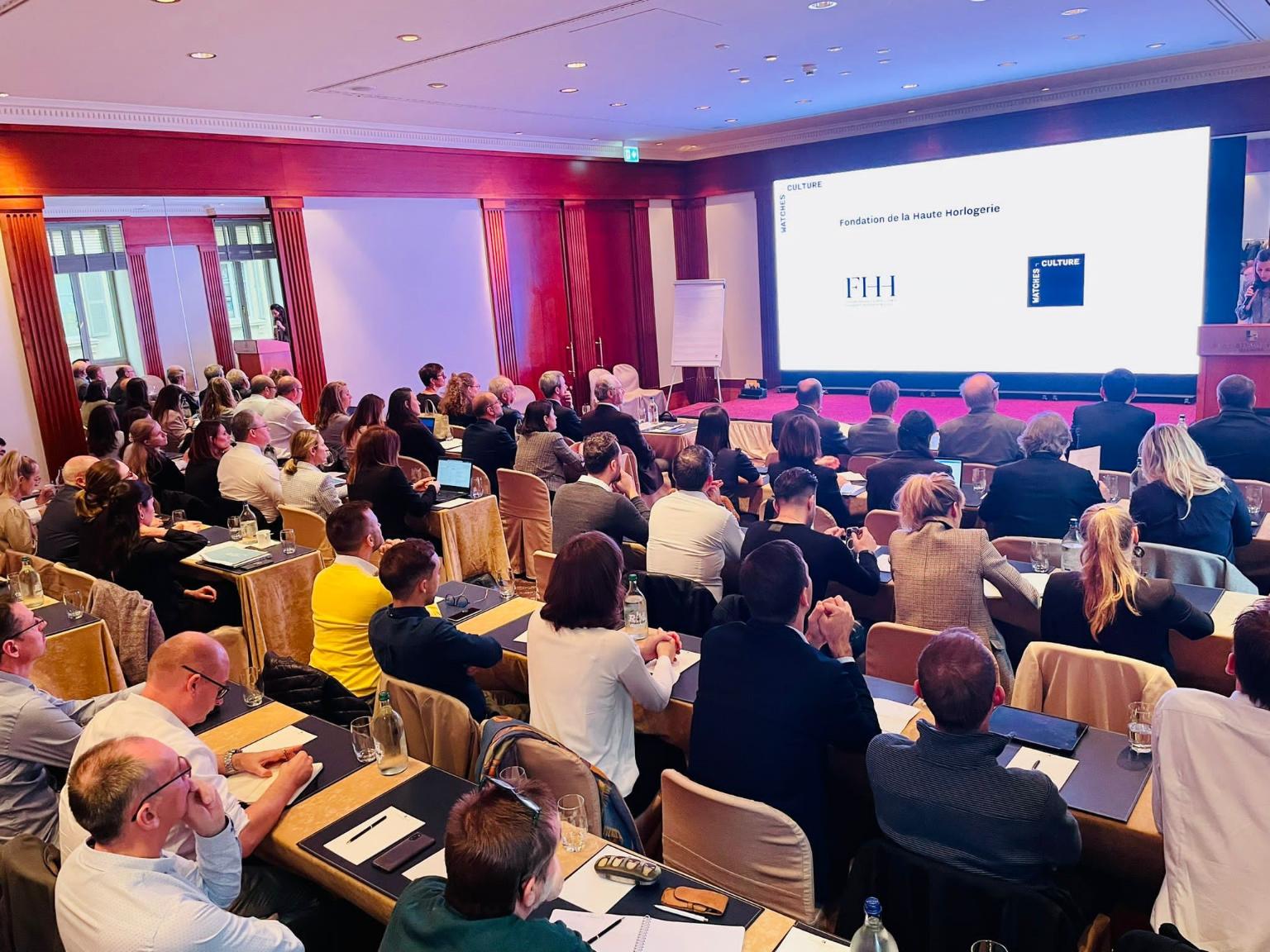On November 3, 2022, Watch and Culture, the cultural arm of the Fondation de la Haute Horlogerie, organized a Masterclass on the compliance – or soft law – in the field of sustainable development. Representatives of the Federation of the Swiss Watch Industry (FH), the State Secretariat for Economic Affairs (SECO) and the World Diamond Council took to the podium. The former spoke at length about the contractual provisions concerning animal-sourced leathers, while the Seco SECO advisor detailed the provisions of the Ordinance on duties of care and transparency with regard to minerals and metals from conflict zones and child labor. Presented as the counterproposal to the "Responsible Enterprise" initiative rejected by popular vote in November 2020, this ordinance came into force in Switzerland on January 1, 2022.
03 November 2022
Masterclass Compliance I
- location_on Hôtel Beau-Rivage, Neuchâtel, Switzerland
The Masterclass organized by Watches and Culture on November 3 focused on sustainability and what is commonly referred to as "Soft Law" or "Soft Compliance". More than 60 participants attended, representing a good cross-section of FHH partner and non-partner watch brands and groups, as well as suppliers to the watchmaking value chain.
Sustainable development and legal provisions
Finally, the former Chairman of the World Diamond Council (WDC) reported on recent developments in the Kimberly Process, which is basically aimed at eradicating "conflict" diamonds from the supply chain. The workshop was followed by two round-table discussions, which were led by the industry's leading auditors, SGS and Mazars respectively. The first on "the strengths, weaknesses and areas for improvement of existing certifications", and the second on "the impact of multiple initiatives". A highly topical issue, the question of certifications and compliance with current legal requirements on sustainability concerns all players in the luxury goods industry. This Masterclass provided a clearer picture of the opportunities and requirements. A follow-up is already on the agenda.
This gathering constituted an excellent opportunity for sharing and collaboration between all the entities present, including several watchmaking and jewelry brand as well as trade associations, in order to strengthen the industry's ties and highlight the need to pool its strengths.
programme. programme. programme. programme. programme. programme. programme. programme
Introduction of the Masterclass
Former General Manager of Toshiba Consumers France, then CEO of Orest s.a., leading subcontractor to international luxury jewelry brands, Charles C. joined Piaget from 2002 to 2009 as Executive Vice President in charge of the Jewellery Business Unit.
In 2009, he was appointed Corporate Social Responsibility Director and member of Richemont SA's CSR and Reputation Committees. He will provide strategic support and Corporate Affairs to the Group's Brands until 2019.
At the same time, Charles C. was heavily involved in the development of the Responsible Jewellery Council, of which he remained a member of the executive committee for 10 years, holding positions including Vice-Chairman and Chairman.
Certified Corporate Director and Expert Consultant; member of the Cultural Council of the FHH, member of the Board of Directors of the Haute Ecole de Joaillerie de Paris and of leading companies in this sector in Europe.
Graduated Major from Sup de Co Bordeaux, MBA from University of Montreal and Ch.B.A. accredited.
The legislative framework: FH activities on behalf of the Swiss watchmaking industry using the example of leather
After studying law at the Universities of Zürich and Fribourg, Yves Bugmann undertook postgraduate studies in economics at the Graduate School of Business Administration (GSBA) in Zürich, graduating with a Bachelor of Business Administration.
He began his career in 2000 as a lawyer at the Swiss Federal Institute of Intellectual Property in Berne. In 2003, he became head of the trademark search department.
Since 2006, he has been Head of the FH Legal Division.
In addition to his duties, Yves Bugmann is a member of the Board of the Swiss Federal Institute of Intellectual Property and a member of the Board of STOP PIRACY, the Swiss platform against counterfeiting and piracy. From 2008 to 2019, he was also a member of the BASELWOLRD panel.
Yves Bugmann is also a member of economiesuisse's "intellectual property", "customs and origin" and "competition law" commissions.
Raphaël Schwarz holds degrees in chemistry from the EPFL and the HES Fribourg, and is an expert in radiation protection.
In 2007, he joined Laboratoire Dubois, specializing in the development and application of methods for the determination of allergenic and toxic substances in watch and jewelry components. In 2011, he was appointed head of the Technico-Legal Assistance Department, where he advises numerous luxury brands and their suppliers on the various global consumer protection regulations and the materials that can be used to achieve compliance.
In 2019, he joins the FH Legal Division as a specialist in regulatory affairs (REACH, RoHS, Proposition 65, SCIP Database, etc.). In this new role, he is responsible for advising watch brands on consumer protection issues, as well as representing them before certain regulatory institutions. He also teaches regulatory affairs at the Swiss Foundation for Research in Microtechnology (FSRM).
Since the beginning of 2022, he has also been Chairman of the ISO/TC 114 Committee, which is in charge of developing international standards (ISO) for the watchmaking sector.
Due diligence in relation to minerals and metals affected by the new Ordinance ("ODiTr[3]") coming into force on 1.1.2022 and/or by sanctions against Russia
Olivier Bovet is Senior Advisor at the State Secretariat for Economic Affairs (SECO), where he coordinates Switzerland's commitment to the international fight against corruption, notably within the framework of the OECD. He also coordinates SECO's supervision of good governance of natural resources in Switzerland.
Olivier Bovet holds a PhD in political science (economics) from the Graduate Institute of International and Development Studies in Geneva. His first professional experience took him to the UNDP office in Islamabad, where he managed industrial development projects in Pakistan (1992-94). He then joined the Federal Administration, and in particular the State Secretariat for Economic Affairs SECO. He managed economic development projects and carried out two missions abroad, to Belgrade (2006-2010) and Tunis (2015-18), where he was deputy head of Swiss economic cooperation. In 2018, he joined SECO's International Investment and Multinational Enterprises Division, where he focuses on anti-corruption and the natural resources sector.
Kimberly Process and System of Warranty update
Stéphane Fischler is a third-generation Belgian diamond dealer with many years' experience in the local and international diamond industry, which he has actively supported since the 1980s.
First with the Antwerp World Diamond Center, an organization representing the interests of Antwerp's international diamond trade, for which he served three consecutive terms as president. He has also been heavily involved in the issue of "conflict diamonds", and was approached in early 1999 to study the diamond industry's efforts to combat the trade in diamonds that fuels conflict. As a result, the industry created a certification system that became what is now known as the "Kimberley Process" (KP), as well as the World Diamond Council in Antwerp in 2000.
Since then, Stéphane has remained very active in promoting KP standards, their implementation and ways to strengthen their impact. He was elected Vice-Chairman and then Chairman of the WDC until May 2020. He was invited to join the Diamond Development Initiative (DDI) early on by its Chairman Ian Smillie, as well as the Responsible Jewellery Council as a board member representing the International Diamond Manufacturer Association.
Stéphane is currently Chairman of CIBJO's Technology Committee and a member of RESOLVE's Board of Directors.
Certifications in place: strengths and weaknesses, areas for improvement?
Michel Mooser is a consultant and trainer in quality and environmental management systems for the public and private sectors, and in ESG project development.
He holds a Master's degree in engineering from ETH Zurich and 2 Master's degrees from EPFL in environmental sciences and environmental auditing.
Delegate for the ICRC (International Committee of the Red Cross) in Pakistan, Liberia, the Philippines and the former Yugoslavia;
He has over 24 years' experience as an auditor and more than 10 years' experience as a verifier of sustainable development and greenhouse gas emissions reports.
Mr Mooser has worked for clients both in Switzerland and abroad. He has worked for the watchmaking industry for many years, including as an auditor for the RJC. He is currently audit manager for SGS.
Multiple Initiatives: what impact? Areas of improvement?"
Franck Paucod holds a Master's degree in Economics and a Chartered Accountant diploma. He has also completed an Executive MBA in Sustainable Management.
He has over 30 years' experience as a financial auditor and nearly 10 years as an accredited CSR auditor: Eco-Entreprise, RJC, LBMA, LPPM, Fairmined. He has also been an auditor of sustainable development reports for the past 3 years.

